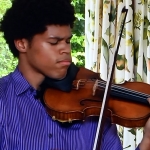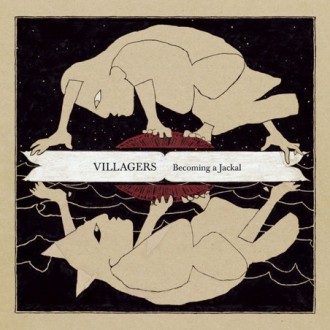Villagers Becoming A Jackal
From the very first seconds of Becoming A Jackal, he’s got you. A faint drone of organ, joined by eerie strings and a cascade of piano that collectively casts a Hitchcock movie shadow before a hushed voice asks, “Have you got just a minute? / Are you easily led? / Let me show the backroom / Where I saw the dead / Dancing like children on a midsummer morn / And they asked me to join” – and then the music obliges by with a similar spectral sweep. ‘I Saw The Dead’ is not just the album intro of 2010 to date but also a magnificent intro to the narratives, poetry and melodic depth of Conor J. O’Brien – or as he likes to call himself and his cohorts, Villagers.
Over the course of 11 varied, subtle, complex and plain gorgeous songs, the Dubliner shows just why he is Domino’s latest signing, while defying any easy categorisation of his influences or peers. O’Brien namechecks David Axelrod, Jens Lekman, Robert Wyatt and Rufus Wainwright but you could equally add Paddy McAloon, Paul Simon and Randy Newman to the possible roots of this record. And its creator is just as captivating in person.
If the album has a theme, it’s change - “whether physical, emotional or and spiritual,” O’Brien ventures. “I guess a large part of it is concerned with growing up; gaining and losing friends… these things change a person and I suppose this is my way of making sure I don’t become a bitter old mess! But I only realised this in hindsight. I don’t write in a conscious way; the only thing I start with is a visual image or colour, and then it just happens. One line suggests the next, until I have a little patchwork quilt of ideas. If I stick at it long enough, it all comes together and makes narrative sense.”
Growing up in Dun Laoghaire, a south-east seaside Dublin suburb, O’Brien wrote his first song, aged just 12, a week after his older brother lent Conor his acoustic guitar. “Bizarrely enough, my first lyric was “When I’m walking down these streets, I feel like a monkey in the Arctic”. I haven’t told Domino that yet! The song was called ‘Psychic’, which was about being afraid of a psychic friend because he could read your thoughts. Yes, it was a weird one…”
Roald Dahl books, Jim Henson fantasy films (The Dark Crystal, Labyrinth) and a passion for model painting fed the teen Conor’s imagination, while his first band, formed with three friends from St. Conleth’s College in Ballsbridge, Dublin, defined the adult version. The Immediate were loved in Ireland for their whip-smart, literate bursts of melody, and their sole album In Towers and Clouds was considered the best homegrown debut since U2’s Boy back in 1980. But as the accolades escalated, the band shocked everyone by suddenly breaking up. “It felt like ending an incredible long-term relationship. I’m terrified of bands now, so I do everything myself” says O’Brien, who created the artwork and played all the instruments on Becoming a Jackal (except for the strings and French Horn which were arranged by Villagers pianist/organist Cormac Curran).
After choosing the name Villagers - “I like the name because it doesn’t offend the songs” - O’Brien released The Hollow Kind EP in February 2009 and the 7” ‘On a Sunlit Stage’ last October on the Any Other City label, run by Villagers drummer James Byrne. After signing to Domino, Becoming a Jackal was recorded in Villagers guitarist Tommy McLaughlin’s home studio, with Tommy engineering and co-producing alongside Conor. “We wanted to make it sound a bit like a Neil Young album, not to dress it up too much, like someone is whispering in your ear, but also to get the epic-ness at times.”
As well as playing solo shows, Villagers also play live as a full band, with Conor being joined onstage by James, Tommy, Cormac and bassist Danny Snow, as well as sometime collaborators David Crean (on keys) and Richie Egan (of the Dublin-based bands The Redneck Manifesto and Jape); “They‘re central to all this. When we rehearse, my little dictatorial act is over and they find their own way of playing it. The shows are one of most exciting things for me as the music morphs, so you can hear new lines coming in and things dropping out. But we only rehearse for a couple of days before a tour, so it’s easy. It means I can keep writing instead of being locked in a room together three days a week. I’ve always preferred solitary writing, shutting your brain off from everything else.”
From restrained to unleashed, from a whisper to a literal howl, Becoming a Jackal mutates, intrigues and beguiles in equal measure. After the psycho-drama of ‘I Saw the Dead’, the title track – and first single – reveals O’Brien’s breezier pop chops and a story of hard-fought freedom (“When I grew bolder/ Out onto the streets I flew / Released from your shackles / I danced with the jackals / And learned a new way to move”). ‘Ship of Promises’ is marked by a rubbery skiffle beat and an opaque lyric (“You see a mask from your window at night / So you wake and you go outside and you put it on”) while the fragile ‘The Meaning of the Ritual’ is much more direct. “Setting myself a task is another way of writing, and I wanted to write a love song that wasn’t positive toward the idea of love. I wanted to dress it down’.
‘The Pact (I’ll be your Fever)’, to give the song its full title, crosses ’50s pop innocence with a dark heart. “I’m told it sounds like Roy Orbison,” says O’Brien. “To me, it’s almost like an emancipatory hymn! It’s almost celebrating romantic love or unadulterated worship as a way of saving you from staring into the complete nothingness of the day; into the abyss.”
‘That Day’ is equally another summery melody masking existential doubt. “It’s about how some people manage to live their lives incredibly well while others only see this bleak emptiness, and trying to express that in a rollicking pop song! To me, it’s my glamourous Scott Walker rock’n’roll song - not that it sounds like him. But it feels like I’m letting something out in a bold, brash way, where some of the other songs curl around you a bit more.”
One of those ‘curling’ songs would be the wistful, folky ‘Twenty-Seven Strangers’, a lyrical journey mirroring an everyday bus trip that’s the essence of bittersweet. “On a bus, people don’t communicate with each other – we’re crippled by all this social mundanity. But we come home to a loved one, and then we do it all over again next day. I wanted to express that repetition. I like writing about things that are universal and stifling, but that we don’t talk about. But rather than sounding morose, I always want to maintain a celebratory togetherness, which is the root of folk and blues.”
Between ‘Twenty-Seven Strangers’ and the closing sobriety of ‘To Be Counted Among Men’ is the album’s soul epic ‘Pieces’ (“For a long, long time / I’ve been in pieces / In the corner of a room / In an endless afternoon”) and a showcase for some of the best howling ever recorded. Howling, as jackals do. Or Villagers. “Howling was an incredible feeling, especially coming after those particular words. I don’t want to depress people, so a touch of melodrama can really connect.”
Young in face but intense around the eyes, O’Brien will probably never run out of insights and incidents, so you can be sure that Villagers will be around for the long term. Which suits him just fine. “I don’t want this ever to be the finished product, but to be constantly changing, moving and growing. I can hear so much more.”
Page: 1 2
|
|

|

The All-American Rejects |
LATEST GALLERY IMAGES

Where Israel Goes, Misery Follows 
The Kanneh-Masons |
|
|


